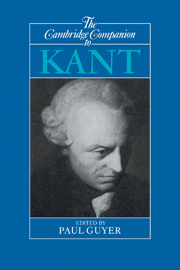Book contents
- Frontmatter
- Introduction
- 1 Kant's intellectual development
- 2 The Transcendental Aesthetic
- 3 Functions of thought and the synthesis of intuitions
- 4 The transcendental deduction of the categories
- 5 Causal laws and the foundations of natural science
- 6 Empirical, rational, and transcendental psychology
- 7 Reason and the practice of science
- 8 The critique of metaphysics
- 9 Vindicating reason
- 10 Autonomy, obligation, and virtue
- 11 Politics, freedom, and order
- 12 Taste, sublimity, and genius
- 13 Rational theology, moral faith, and religion
- 14 The first twenty years of critique
- Bibliography
- Index
6 - Empirical, rational, and transcendental psychology
Psychology as science and as philosophy
Published online by Cambridge University Press: 28 May 2006
- Frontmatter
- Introduction
- 1 Kant's intellectual development
- 2 The Transcendental Aesthetic
- 3 Functions of thought and the synthesis of intuitions
- 4 The transcendental deduction of the categories
- 5 Causal laws and the foundations of natural science
- 6 Empirical, rational, and transcendental psychology
- 7 Reason and the practice of science
- 8 The critique of metaphysics
- 9 Vindicating reason
- 10 Autonomy, obligation, and virtue
- 11 Politics, freedom, and order
- 12 Taste, sublimity, and genius
- 13 Rational theology, moral faith, and religion
- 14 The first twenty years of critique
- Bibliography
- Index
Summary
Although Kant never developed a theoretical psychology of his own, he discussed psychological topics throughout his life. These discussions ranged from early, brief remarks on mind-body interaction in the True Estimation of Living Forces (§§5-6, 1:20-1) of 1747 to the relatively late, extended treatment of the faculties of cognition in the Anthropology, published from Kant's lecture notes under his supervision in 1797. In his lectures on metaphysics, from the 1760s onward, he followed common practice and regularly discussed what he and his contemporaries called “empirical” and “rational” psychology (records of these lectures survive through student notes: 28:59- 122, 221-301, 583-94, 670-90, 735-75, 849-74, 886-906). And in the preface to his Metaphysical Foundations of Natural Science (1786) he examined the question of whether empirical psychology could ever achieve a scientific status like that of physics, notoriously answering that it could not (4:471). For our purposes, however, the central problems pertaining to Kant's relation to psychology arise in the Critique of Pure Reason. In the Critique Kant distinguished his philosophical aim from that of empirical psychology. He also investigated the possibility of empirical and especially of rational psychology. In addition, and problematically, he adopted, even in the avowedly philosophical portions of the work, an implicitly psychological vocabulary. Because of his extensive use of this vocabulary, interpreters have, from the instant of the Critique's publication, disputed the extent to which Kant rested his arguments on psychological ground.
- Type
- Chapter
- Information
- The Cambridge Companion to Kant , pp. 200 - 227Publisher: Cambridge University PressPrint publication year: 1992
- 29
- Cited by



